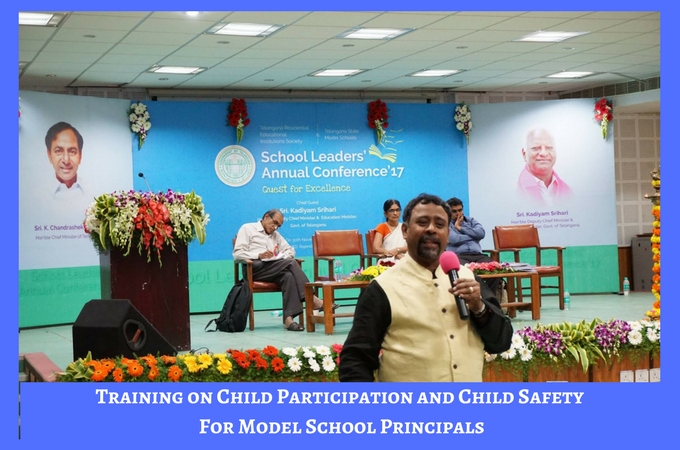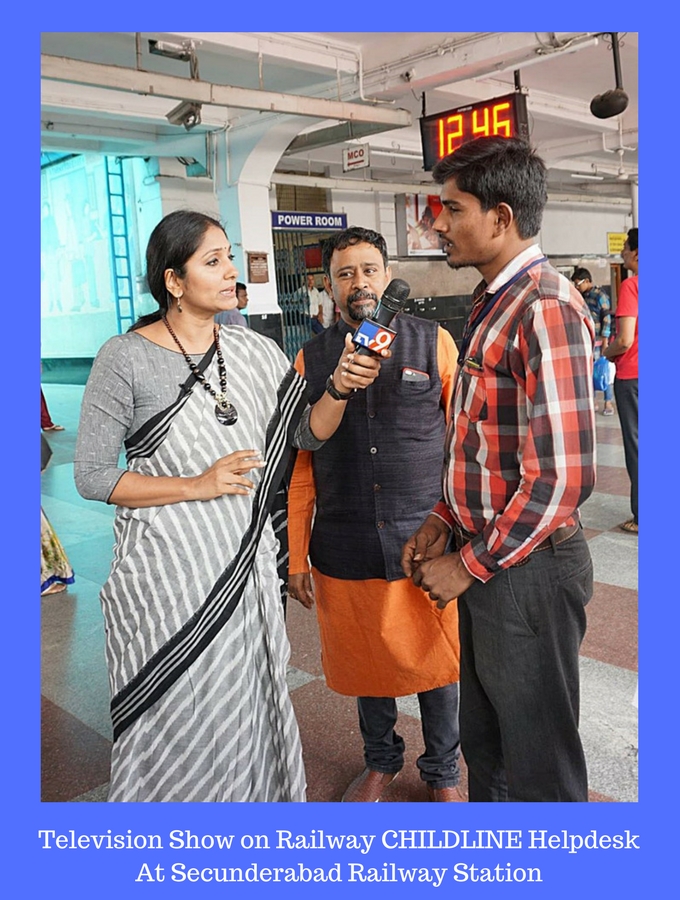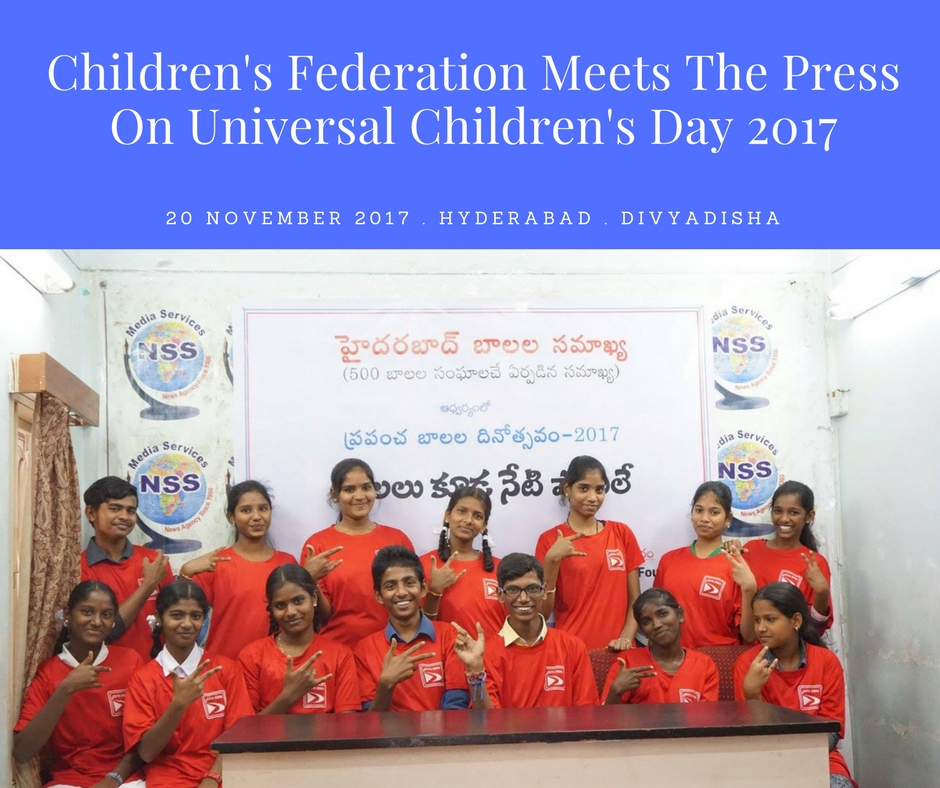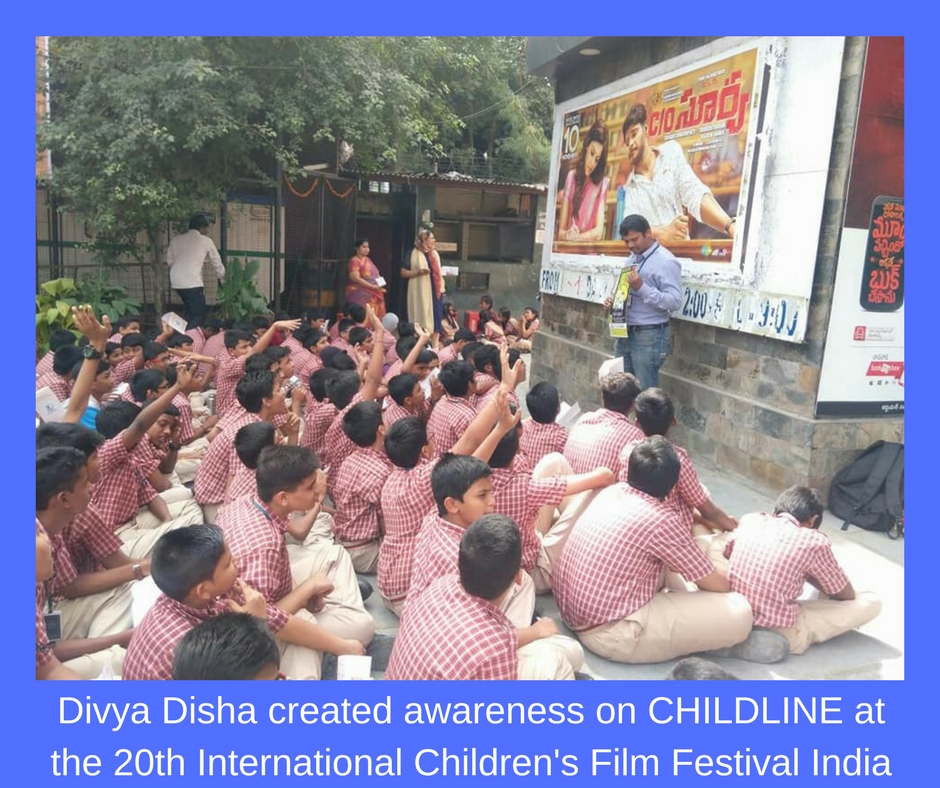Our Director, Mr Isidore Phillips, was invited by the Director of School Education, Telangana on Child Participation and Child Safety For Model School Principals. Today, we’re attempting to give you a gist of his talk (which was mostly in Telugu).
Session on Child Participation and Child Safety For Model School Principals
Children have rights- because they are human beings they have rights. The journey towards the child rights convention.
The lenses we wear to look at children defines the way we deal with children.
For school leaders the first question that we have today is what is your philosophy about children? What is your perspective about children? Do you think that children are human beings? Do you think that children can think and feel? Do you think children have opinions? Then the schools we run will be places where child enjoy respect.
Sadly, there continues to exist the mistaken concept of the child being a ‘tabala rasa‘ – a canvas on which the teacher can paint! When the teacher becomes a dispenser of information, knowledge giver, transmitter of information. It proves one thing that the teacher is the boss and the students are her/his subjects. The power rests with the teacher. The power dynamics in the classroom, which play such an important role in learning, are most often between the teacher and the ‘taught’.
The dehumanization of childhood begins the moment the child becomes undervalued as a human being.
Many teachers believe that discipline is synonymous with violence. The notion that ‘a quiet classroom shows a good teacher’ is past its use-by date.
The discussion about education must begin with the way the school leaders look at children and their philosophy about children and their views about children and childhood. We only have to look around to see the violation of the human rights of children, if the paradigm of education is warped.
As school leaders ask what you can bring into a school or a classroom.
Children are experts at understanding the philosophy and psychology of teachers.
One of the biggest fallacies of our system is that teachers underestimate the knowledge of children. When teachers and educators realize that children are not passive recipients of information, classrooms will change.
Principals and teachers have started talking about the syllabus being a problem. For an incompetent teacher, the syllabus is always difficult! A smart, competent teacher knows how to navigate the syllabus. If we can’t do this, we have failed as planners.
Engage with students and allow them to participate
Teachers are supposed to be professionals, but often fail to be so. We have to learn how to engage with children. We have to listen to them and work with them on making learning meaningful.
Let discipline become the responsibility of children as much as that of the teacher. Share responsibility. Children are responsible. Children are intelligent.
Instead of comparing children and cribbing about slow learners, we must learn to understand that children have various kinds of intelligence. This has to be appreciated. The structure in a classroom, the way a child sits and moves is very important.
If a child can become a participant in the classroom, everything changes in my classroom.
There is no more resourceful person than a teacher and as School Leaders, Principals have a lot of resources at hand to make child participation a reality.
All of us carry our emotional climate with us. Teachers carry their emotional climate into the classroom. Whether there is sunshine or it is raining or it is winter, they know what to do in the classroom. They are resourceful human being who can think on their feet.
The problem is that our classrooms have become bankrupt. Teachers have stopped thinking. Let’s us change the way we think.
Sharing about child participation from Divya Disha’s experience
Mr Phillips shared Divya Disha’s experience of working with children in the urban slums and adolescents in the districts. He spoke of how the Children’s Organizations’ Leaders are confident to enough to plan, strategize, write petitions and approach a Corporator or an MLA. This process of empowerment has a trickle down effect with other children in their community and school.
He offered the services of Divya Disha to start Children’s Organizations in their schools. Mr Phillips said that having a Children’s Organization in a school is a great boon for the Head Teacher/ Principal who will be able to get feedback and opinions of their students through the Child Leaders. This way the children get to be involved in their own education.
However, it is sad that most training programmes for teachers that are looking at bringing about the change in the s
We always do things for children without them. It is time that we engage with children. Children should be central to the whole process of change.
If we listen to children and their opinions children and educators can become partners in the process of change.
The education system has so many players that we can have plenty to complain of – the administration, parents, society, media etc. Mr Phillips gave the example of someone saying, ‘I am a drop of water in the mighty ocean, what difference can I make?’ In the sea of people what difference can one teacher, one principal make? But as someone responded, ‘Don’t be a drop of water. Be a matchstick. One matchstick can set a whole forest on fire.’
He hoped that school leaders would be that matchstick, because we need strong leaders.
We need strong school leaders to stand up and say, ‘This is education. This is how a school should be. Learning should take place in this manner. This is not a market. I am not running a factory.’



